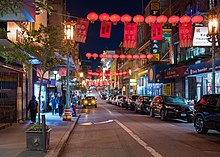 Grant Avenue at Bush Street:
The Dragon Gate at the entrance to Chinatown | |
| Former name(s) | Calle de la Fundación,[1] Dupont Street[2] (1847)[1] |
|---|---|
| Namesake | Ulysses S. Grant |
| Location | San Francisco, California |
| Postal code | 94108 |
| Coordinates | 37°47′51″N 122°24′25″W / 37.79750°N 122.40694°W |
| South end | O'Farrell Street |
| Major junctions | Jackson Street in Chinatown |
| North end | The Embarcadero |
| Construction | |
| Inauguration | 1845[citation needed] |

Grant Avenue in San Francisco, California, is one of the oldest streets in the city's Chinatown district. It runs in a north–south direction starting at Market Street in the heart of downtown and dead-ending past Francisco Street in the North Beach district. It resumes at North Point Street and stretches one block to The Embarcadero and the foot of Pier 39.
Grant Avenue is primarily a one-way street; automobile traffic can travel only northbound. In 2012, however, the two blocks of Grant Avenue between Sutter and Geary streets were converted to two-way traffic in order to ease southbound traffic congestion during the multi-year closure of Stockton Street, part of the construction plan for the Central Subway.[citation needed]
History

In 1835, the very first housing structure of Yerba Buena (the later San Francisco) was erected by William A. Richardson at what today is Grant Avenue, between Clay and Washington streets.[3]
When California came under the control of the United States following the Mexican–American War of 1846–1848, the street now called Grant was named Dupont Street, in honor of a Naval admiral from the USS Portsmouth (Portsmouth Square, located one block east, was named after that ship). In the following years, Dupont Street became the location for many Chinese stores,[4] along with some opium dens, brothels, and Tong wars.[5]
When San Francisco was rebuilt after being leveled in the 1906 earthquake, Dupont Street was upgraded and given a new name: Grant Avenue, after President Ulysses S. Grant.
Today, the intersection of Grant Avenue and Bush Street marks the southern entrance to Chinatown. Grant Avenue is still written and said in Chinese as "Du Pon Gai" (都板街, Gai 街 means street).[5]
References
- ^ a b Philip Choy (2012). San Francisco Chinatown: A Guide to Its History and Architecture. City Lights Publishers. p. 109. ISBN 978-08-728-6540-2.
- ^ Frank Morton Todd (1914). The Chamber of Commerce Handbook for San Francisco: Historical and Descriptive: a Guide for Visitors. San Francisco Chamber of commerce under direction of the Publicity committee. p. 71.
- ^ Kamiya, Gary (July 6, 2013). "1st S.F. civic improvement: Yerba Buena footbridge". SFGate. Archived from the original on January 6, 2019. Retrieved January 5, 2019.
- ^ "Official map of "Chinatown" in San Francisco". loc.gov. San Francisco: Engraved & printed by Bosqui Eng. & Print Co. 1885.
- ^ a b "American Philatelic Society". The American Philatelist, Volume 91. American Philatelic Association. 1977. p. 525.









